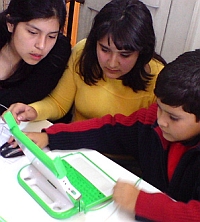I am Benjamin Cohen, Assistant Professor of Science, Technology, and Society at the University of Virginia. We discuss One Laptop Per Child (OLPC) in my senior engineering class on technology and society (STS 401). At the end of the semester, after discussing technologies as being shaped historically by their political, cultural, economic, and environmental contexts, the students do an analysis of OLPC.
To Negroponte and the OLPC Foundation, [any problems with OLPC are] all "snags" that came about along the way. They are all, that is, unanticipated consequences. The premise for my students in their analysis was that while the above "snags" might not have been straightforwardly predictable, they were more properly anticipatable consequences.
The first year I did this exercise, in Fall 2007, I'd say the two classes of 25 each were mostly irritated with OLPC, but considerate of how the project might work more effectively. Some students were full out hacked at MIT, don't get me wrong, considering the design approach flawed from the start for having been culturally inept. But others were somewhat gung-ho about it. I'd say it was an even split between "let's try to make this better" and "this is conceptually flawed from the start and should not be promoted."
This last semester, Fall 2008, for whatever reason, the students were far more frustrated with OLPC and the MIT design strategy. I tried as best as I could to present it the same way both times -- which means that while I had been the one to introduce the various ways technologies are shaped by their broader contexts over the course of the semester, I hadn't said outright to them, "listen, this OLPC sure sucks, so why is that?" But this second go around, the students were more concerned with the OLPC approach. I'm not sure why, but that doesn't really matter here.
The critique began with Negroponte and OLPC's stated mission to:
"to ensure that all school-aged children in the developing world are able to engage effectively with their own personal laptop, networked to the world, so that they, their families and their communities can openly learn and learn about learning."
They questioned the project's guiding assumption that "more laptop/children = more progress"; they also questioned the assumptions of the project that infrastructure & educational systems would be comparable everywhere, all at once. Mostly, they questioned the tragically common view known as technological determinism -- that a given technology will lead to the same outcome, no matter where it is introduced, how it is introduced, or when.
The outcomes, on this impoverished view of the relationship between technology and society, are predetermined by the physical technology. (This view also assumes that what one means by "technology" is only the physical hunk of material sitting there, as opposed to including its constitutive organizational, values, and knowledge elements.)
In the case of OLPC, the project assumes equal global cultural values & regional attributes. It also assumes common introduction, maintenance, educational (as in learning styles and habits), and image values everywhere in the world.
Furthermore, it lives in a historical vacuum assuming that there is no history in the so-called "developing world" for shiny, fancy things from the West dropped in, The-Gods-Must-Be-Crazy style, from the sky. How could the same laptop have the same meaning and value in, say, Nigeria and Indonesia, Papua New Guinea and Alabama, Malawi and Mongolia?
In addition to that basic critique against tech. determinism, the students brought up issues of distribution, control, power (political and electrical), disposal, other life-cycle issues, assumptions of individualism, role of community, and more.
I bring this up here, at the blog, because it's a good example of good intentions -- the MIT Lab wants to educate the world with the premise that education is empowering, and I didn't find any students who disagreed -- executed outside of a meaningful cultural context.
I also bring it up as I prepare my syllabus for this Spring's engineering and environmental ethics course, another annual venture for me (STS 402). Plus, I wanted to share this cartoon, which one team of students brought in for their presentation about the OLPC analysis. It adds another dimension to the critique:
It's an interesting project, this OLPC. And it's a good one to analyze from a socio-technical perspective. I don't assume, or know if, Negroponte is a bad person. In fact I assume otherwise, that he's a decent guy. But I do know that for technological contributions aimed at "progress" to work requires more than good intentions.
This post was originally published as The Problems with One Laptop Per Child and is excerpted here with Professor Cohen's permission. If you'd also like to contribute to the OLPC News dialog, please submit a Guest Post today.




Let me just give some opinions from our experience in Uruguay.
Certainly, the assumption that just giving laptops, not only would have weakened the project, but also would have made it unpopular. Instead, making the laptop and internet a tool - or an "ecosystem", like Antonio Battro likes to call it - that has to be apropiated by the educational system and the whole society, makes it a challenge for everyone, and people gets more involved in our next generation's education - something that doesn't happen easily in our individualist societies. In this way, OLPC is more a laptops provider than an educational project.
These laptops have good ideas for educational purposes, although many of them don't work properly (like the mesh). However, the most important aspects of educative capabilities comes from their software: Sugar and the applications developed on the top of it. So we are facing great challenges in this moment, as we have to build strong communities and services to develop software to accomplish our needs.
Finally, I'd like to remark that it's not true that children stop playing football or other traditional games just for having a laptop, like the cartoon suggests. I have traveled the whole country, visiting schools and public areas, talking with teachers, parents and kids, and I still haven't found just a case of isolation or "addiction" to the use of the laptops: They use it a lot the fist days, but then it becomes just like one more toy, used sporadically - or when the teachers ask them to do some work.
It is well known that you cannot get the right answers by asking the wrong questions. I believe that this study began with assumptions that led to asking inappropriate questions, and failing to ask many of the important questions. I cannot tell for sure, because we have here only a vague description of the process.
How can we find out more?
@Pablo - I couldn't agree more, re "laptop as tool" being a path forward. OLPC has always been a laptop provider, it just has never accepted that.
"In the case of OLPC, the project assumes equal global cultural values & regional attributes. It also assumes common introduction, maintenance, educational (as in learning styles and habits), and image values everywhere in the world."
That is simply false. If olpc believed it, then it would have delivered to every deployment a detailed manual covering every aspect. Instead it gave each pilot project a set of basic technologies, and the particularities of how to adapt it to the culture and education system were purposely left to be worked out by the teachers and administrators themselves.
I would add that the very philosophy of constructivism assumes that students will adapt learning to their particular cultural circumstances.
That Benjamin Cohen gets these fundamental points so completely wrong indicates he has a very poor understanding of the olpc project, and certainly is in no position to comment on it. Note, too, that he does not refer us to any successful developing world project that he approves of. Perhaps I am wrong, but my impression is that he lives in a world of abstract theory and ideas, and has never accomplished anything out in the real world.